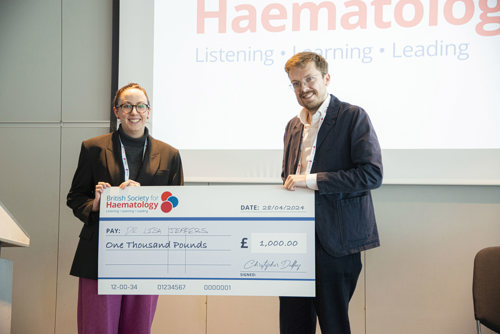
The Crucible Prize is an innovative trainee-led initiative with a £1000 prize. The theme for 2024 award was 'What is the greatest threat to the future of haematology?'
The five best abstracts were selected for oral presentation at the 64th Annual Scientific in Liverpool - which had a record number of attendees. We are pleased to confirm the 2024 winner was Lisa Jeffers.
We interviewed Dr Jeffers to learn more about her journey in haematology and her winning Crucible Prize submission.
What is your education/career background in haematology?
I'm currently an IMT 2 trainee. I'm working on Haematology at the moment and will be in my haematology post for 6 months in total. My interest in haematology came about in my foundation years. I cared for many myeloma patients during my renal post as well as a variety of haematology patients during my critical care placement in FY2. As a result of this I organised a taster week at our tertiary haemato-oncology centre, Clatterbridge Cancer Centre Liverpool (CCC-L). I enjoyed the week so much that I then went on to work as a Junior Clinical Fellow at CCC-L for 9 months. I've attended many great courses run by BSH and undertaken projects that I've had the pleasure of presenting as posters at the previous two BSH annual scientific meetings.
What was your Crucible session presentation about?
This year the Crucible prize theme was 'What is the greatest threat to the future of haematology?'. My session focussed on the very real impact politics has played on our ability to provide safe and effective patient care. In particular, I focussed on clinical trials and our medicines approval pathways since Brexit.
What inspired the content of your presentation?
There has been a lot in the media recently regarding medicines approval and medicines shortages in the UK. I found myself becoming quite frustrated at what was out in the media and realised a gap in my knowledge regarding our medicine's approval pathways, especially since Brexit. It was a good experience to learn more about our drug approval and clinical trial activity.
What does winning this award mean to you?
It was truly an honour and a bit of a surprise. I think the Crucible session is one of the most thought-provoking and interesting sessions of the ASM. It was great to have the opportunity to speak at a conference particularly so early on in my career. I couldn't be more grateful to BSH.
What would your advice be for someone wanting to choose haematology as their specialism?
Get involved! I've found a great community of like-minded colleagues and I haven't even started specialty training yet. The more I learn about haematology, the more my passion for the specialty grows. Haematology can often be a field of medicine that isn't as readily available in medical school or foundation placements. I would definitely suggest taster weeks, BSH educational events and perhaps clinical fellows to expand experience.
What do you plan to do next in your haematology career?
I'm starting as a Lymphoma research fellow at The Christie in Manchester as my next step. This is a great and exciting opportunity to build upon my knowledge of haematology and its role in research and clinical trials.

